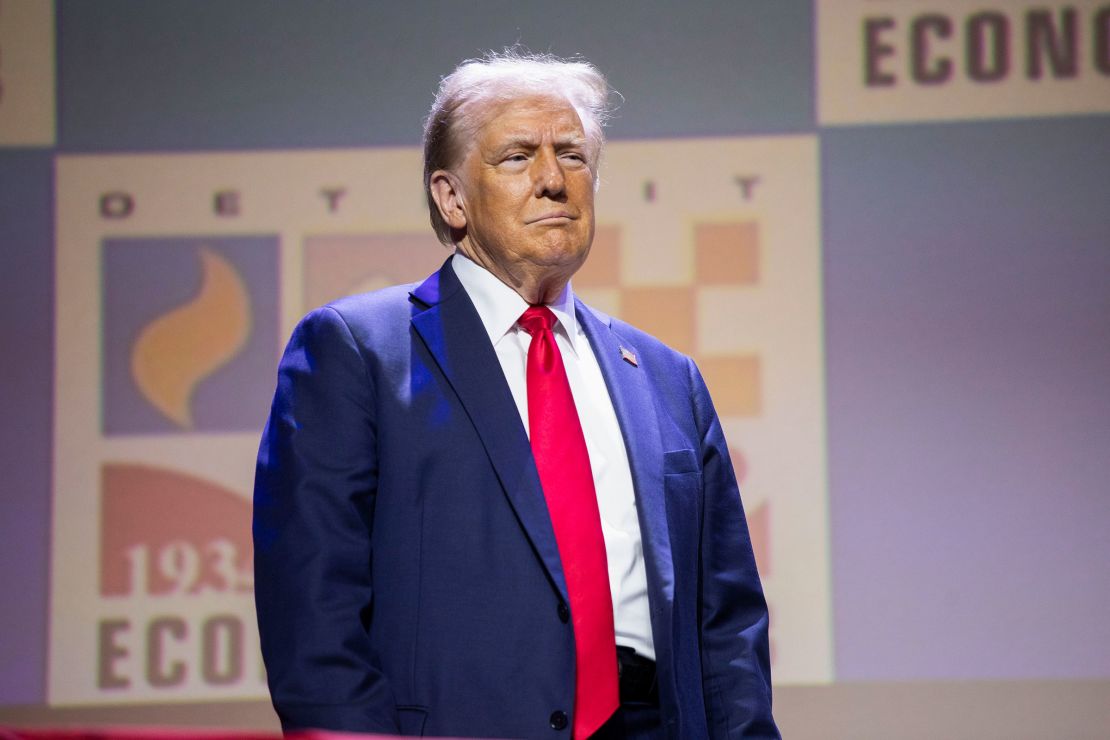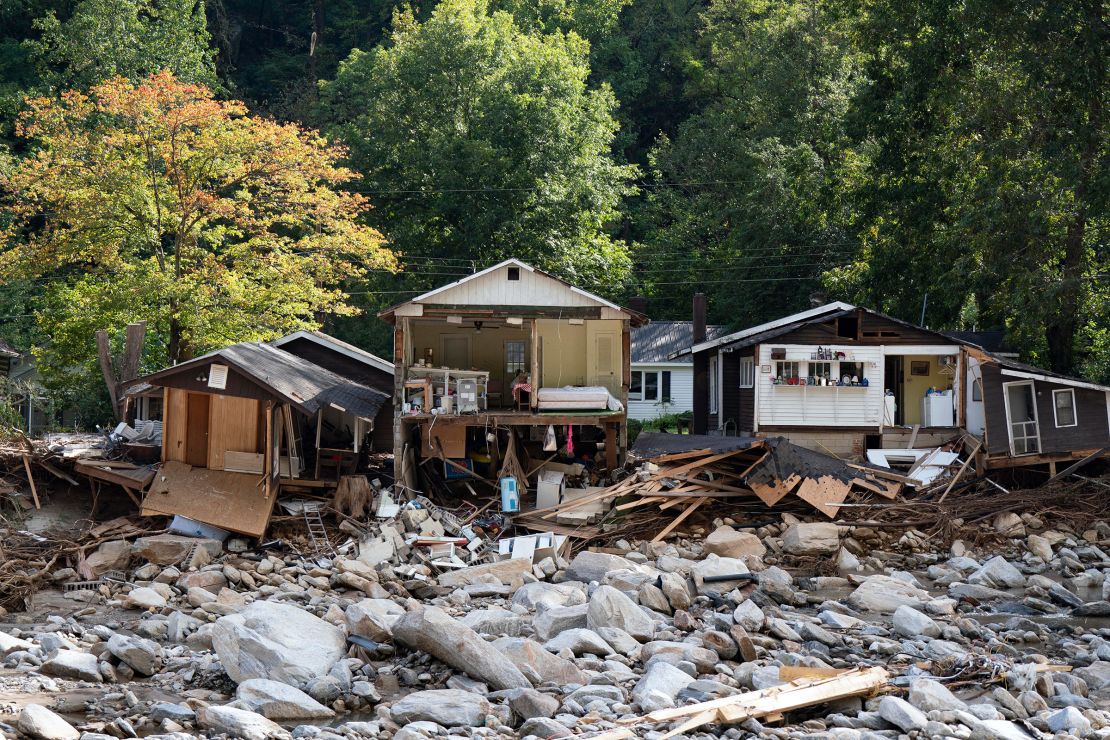Donald Trump’s campaign is making a last-minute push to advocate for early and mail-in voting, methods the former president has falsely vilified for years as dangerous and fraudulent.
With less than a month to go in a tight race, Trump’s campaign is urging people to vote early and by mail, while also working to expand voting access in North Carolina after Hurricane Helene.
In a series of recent virtual town halls and robocalls reviewed by CNN, Trump and his daughter-in-law Lara Trump, the co-chair of the Republican National Committee, have actively encouraged voters to take advantage of early voting options, including mail-in ballots.
“Hi, this is Lara Trump calling on behalf of President Trump’s campaign, and we’re urging you to get out and vote before Election Day,” one robocall says. Earlier this year, Lara Trump voiced a robocall falsely alleging massive fraud in the 2020 election due to mail-in ballots.
At least 286,000 estimated robocalls with this recording were sent to voters, including in the key swing states of Pennsylvania, Georgia, Wisconsin, Arizona, Nevada and Michigan, according to data from Nomorobo, an app that blocks and tracks robocalls. The calls began as early as October 2.
The Trump campaign this past week also asked North Carolina to take steps to expand voting access in the wake of damage from Hurricane Helene – even as Republicans in Georgia opposed an effort to expand voting access by extending registration deadlines following hurricane damage in that state.
Voting rights advocates, while happy to see the Trump campaign join in a bipartisan push for expanded voting access, note that it cuts against a lengthy record of trying to restrict voting in this election and in 2020, when the pandemic upended voting across the country.
“It’s great that the Trump campaign was speaking with the same voice as so many others and asking for expansions to voting access in the wake of Hurricane Helene,” said Sean Morales-Doyle, the director of the voting rights program at the Brennan Center for Justice. “But it does trouble me that they don’t take a sort of uniform approach to that – or to mail voting or to early voting.”
In 2020, the Trump campaign filed several lawsuits to stop many of the changes made by states to make it easier to vote by mail. The changes were put in place to reduce indoor gatherings during the height of the Covid-19 pandemic.
“When you see this flip-flopping on voting, not only does it raise the concern that these policies are based on the politics of who they think will benefit from expanded access … it also makes clear that they know they’re not telling the truth on how expanded access from mail voting or early voting contribute to a denigration of election integrity,” Morales-Doyle added.
North Carolina is one of the key swing states that could decide the presidential election, and the western part of the state affected most by the hurricane is some of the most solid territory for Trump.
Of the 25 counties in North Carolina’s federally declared disaster area, the former president won all but two in 2020, with nearly 63% of the vote. According to the state’s board of elections, there are 481,000 registered Republicans in the 25 counties, compared with 293,000 Democrats.
Trump campaign managers Susie Wiles and Chris LaCivita said in a statement that the proposals to expand voting access in North Carolina “will ensure the people who have already suffered from the storm don’t lose their right to participate in this important election.”
“Swift action from the North Carolina General Assembly and the Governor will ensure the people of their state have their voices heard on November 5th,” they said.
Trump has previously released videos and messages on his social media promoting early and mail-in voting as part of the Republican National Committee’s get-out-the-vote program. Both methods of voting are promoted at Trump’s campaign rallies.
But that push has at times led to conflicting messaging from the former president.
Last month, at a rally in Indiana, Pennsylvania, Trump disparaged early voting, and promoted it, in the same breath.
“We got to get out and vote. And you can start right away. You know that, right? Now we have this stupid stuff where you can vote 45 days early. I wonder what the hell happens during that 45. ‘Let’s move, see these votes? We’ve got about a million votes in there. Let’s move them. We’re fixing the air conditioner in the room, right?’ No, it’s terrible,” Trump said. “What happened the last time was disgraceful, including right here. But we’re not going to let it happen again. You know, too big to rig, right? That’s one way you do it.”
In 2020, Trump called mail-in ballots “dangerous” and “corrupt.” He said they’d lead to “massive electoral fraud” and a “rigged” 2020 election.
Now locked in a tight election against Vice President Kamala Harris, Trump’s campaign is actively promoting early in-person and mail voting, even as the former president pledged to one day eliminate the commonly used practices. He falsely implied they were insecure voting methods in a June video posted to Swamp the Vote USA, a voting resource website paid for by the Republican National Committee.

“I will once and for all secure our elections. We’re going to go to paper ballots. We’re going to have same-day voting, voter ID. We’re going to do it properly. We’re going to have good, secure, beautiful elections. We never want what happened in 2020 to happen again,” Trump says directly to the camera. “But until then, Republicans must win. And we must use every appropriate tool available to beat the Democrats. … Whether you vote early, absentee, by mail or in person, we’re going to protect the vote.”
The Republican parties in Arizona and Nevada also tapped Lara Trump to voice robocalls promoting early and mail voting, despite previously echoing her father-in-law’s rhetoric on early voting.
“With your help, we’re going to secure a massive victory in Nevada,” Lara Trump says on the Nevada robocall. “So, get out there, encourage others to vote early and remind them just how critical this election is. When we vote, we win.”
In April, CNN’s KFile reported Lara Trump sent out a scripted call to voters’ phones saying Democrats committed “massive fraud” in the 2020 election.
“We all know the problems. No photo IDs, unsecured ballot drop boxes, mass mailing of ballots, and voter rolls chock full of deceased people and noncitizens are just a few examples of the massive fraud that took place,” the RNC call from April said. “If Democrats have their way, your vote could be canceled out by someone who isn’t even an American citizen.”
Pushing North Carolina to expand access
On Tuesday, the Trump campaign issued a statement proposing 10 policy changes for North Carolina to help voters in areas hit by Hurricane Helene, some of which were enacted by the state legislature.
The Republican-led legislature’s bill, which was signed into law by Democratic Gov. Roy Cooper on Thursday, gave the 25 counties in the federally declared disaster area additional flexibility to run their elections. The law contains provisions similar to several of Trump’s proposals, including giving counties more flexibility on early voting hours and allowing counties to use temporary voting locations if precincts are unusable.

“I will give the Republicans who are in charge here credit for passing good legislation (Wednesday) that definitely will address needs of voters,” said Bob Phillips, the executive director of Common Cause North Carolina, a group that advocates for expanded voter access. “The biggest thing is giving each of these county board of elections the flexibility with regards to voting sites, both for early voting and Election Day.”
The Trump campaign also proposed expanding bipartisan teams to help voters request and deliver absentee ballots to county boards and allowing voters displaced to other counties in the state to cast provisional ballots that would be delivered back to their home county.
In Georgia, however, where Helene also caused significant damage, Republicans opposed an attempt to expand voter access. The Republican National Committee intervened as a defendant in a lawsuit brought by civil rights groups to extend the county’s voter registration deadline, which was Monday.
A federal judge on Thursday denied that motion, saying it “lacked clarity and detail” as to how specific individuals were harmed.
A similar lawsuit over the voter registration deadline in Florida – which is still determining the damage inflicted by Hurricane Milton – was also dismissed by a federal judge on Wednesday.
An RNC spokesperson said liberal groups in Georgia were trying to use the courts to extend registration deadlines enacted by the legislature, when voters have had months to register to vote in Georgia.
“As many Americans are still reeling from the impact of Hurricane Helene, the Trump Campaign and RNC are fighting to expand voting access for those displaced, and we are meeting voters where they are to ensure they are educated on voting changes,” said RNC spokesperson Anna Kelly.
Trump and his allies have argued there’s a difference in changes approved by a legislature – like the campaign asked North Carolina to do – and many of the changes that were made in 2020 by election boards during the pandemic.
Voting rights advocates say while the circumstances are different between a pandemic and a hurricane, the idea of allowing displaced voters to participate in an election should be the same.
“Even to the extent these disasters cause different hurdles, the policy solutions are often the same,” said Morales-Doyle of the Brennan Center. “Expanded access is key, and in order to expand access, funding is key. The things we’re advocating for right now in North Carolina and Florida, in many ways, echo the things we were advocating for in 2020.”













